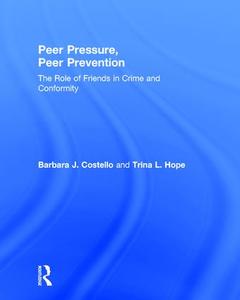Peer Pressure, Peer Prevention The Role of Friends in Crime and Conformity
Auteurs : Costello Barbara J., Hope Trina L.

Criminological research has largely neglected the possibility that positive peer influence is a potentially powerful source of social control. Quantitative methods tease out cause, effect, and spuriousness in the relationship between peer delinquency and personal delinquency, but these methods do little or nothing to reveal how and why peers might influence each other toward--or away from--deviance.
Costello and Hope take a first step toward uncovering the mechanisms of peer influence, drawing on quantitative and qualitative data collected from two convenience samples of university students. Their quantitative analyses showed that positive peer influence occurs most frequently among those who associate with the most deviant peers and self-report the most deviance, contrary to predictions drawn from social learning theories. Their qualitative data revealed a variety of methods of negative influence, including encouraging deviant behavior for others' amusement, a motive for peer influence never before reported in the literature.
1. Introduction: The Study of Peers and Deviant Behavior
2. Theory and Research on Peers and Deviance
3. Qualitative Accounts of Negative Peer Influence
4. Mechanisms of Positive Influence
5. Explaining Peer Informal Social Control
6. Conclusions and Recommendations for Future Research and Policy
Barbara J. Costello (Ph.D., University of Arizona) is Associate Professor of Sociology at the University of Rhode Island. Her research has focused on testing and extending control theories of crime and delinquency, and on the explanation of both positive and negative peer influence.
Trina L. Hope (Ph.D., University of Arizona) is Associate Professor of Sociology at the University of Oklahoma. Her research has focused primary on criminological theory-testing, including applying concepts from control theories to gang membership, gang and dating violence, adolescent sexual activity, pregnancy resolution, and substance use.
Date de parution : 03-2016
19.1x23.5 cm
Date de parution : 03-2016
19.1x23.5 cm
Thèmes de Peer Pressure, Peer Prevention :
Mots-clés :
deviant; behavior; social; control; theory; effect; positive; cultural; deviance; theories; Young Man; Positive Peer Influence; ISIS Recruit; Peer Influence; Peer Influence Process; Negative Peer Influence; Positive Peer Pressure; Cultural Deviance Theories; Adolescent Peer Influence; Social Control Theory; Respondent Deviance; Peer Attachment; Delinquent Friends; Negative Relationship; Deviance Index; Peer Delinquency; Encourage Bystander Intervention; Social Control Variables; Peer Deviance; Peer Influence Effects; Self-reported Deviance; College GPA; Peer Delinquency Relationship; Deviant Friends; Prosocial Influence



